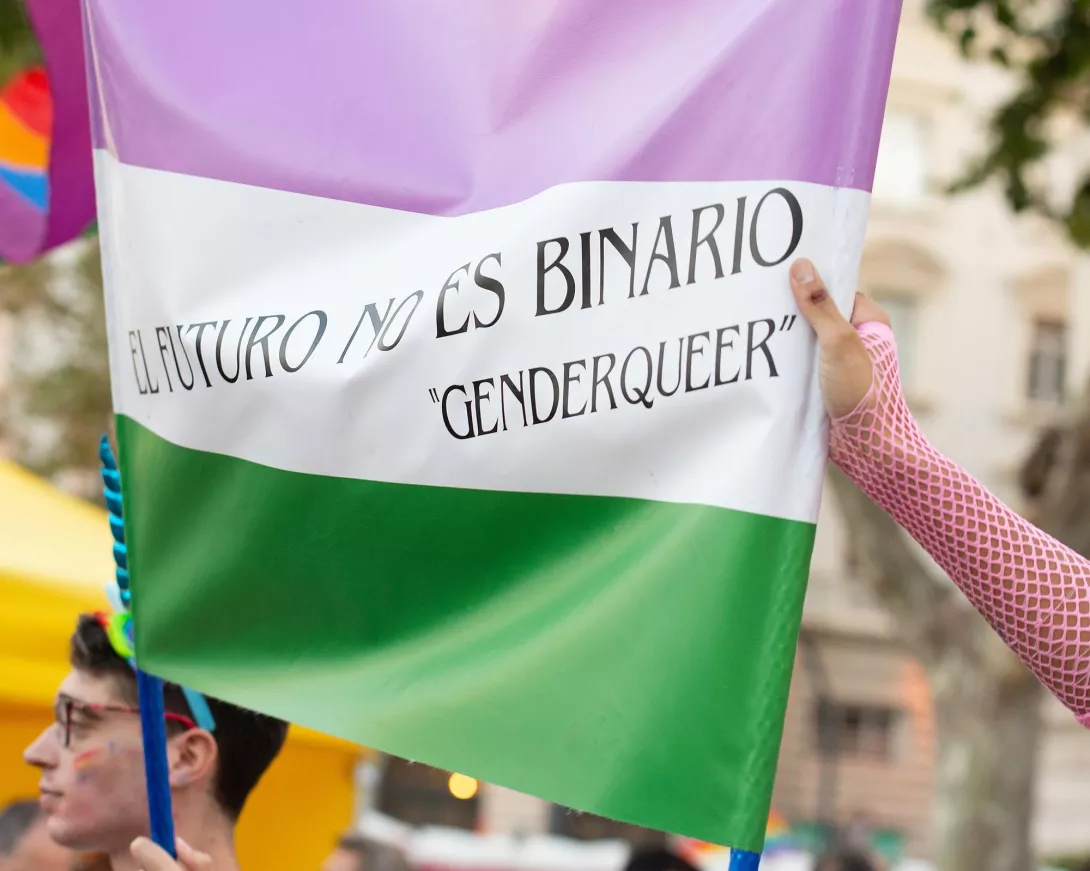
Published in El Salto, 16 February 2020 (original in Spanish)
After more than three years, and more than five years of the recognition of the free determination of gender identity in Andalusia, in November 2019, I finally achieved exactly this: that the Andalusian Health Service recognized my gender identity outside the binary of man and woman, as, in my case 'indeterminate' (not to say 'genderqueer'). It has been a long and sometimes frustrating struggle.
Law 2/2014 of 8 July, the Integral Law for Non-Discrimination on the grounds of Gender Identity and Recognition of the Rights of Transsexuals in Andalusia, in theory guarantees the right to gender identity. The rationale for this law states: "The free self-determination of the gender of each person must be affirmed as a fundamental human right". And Article 2 of that law codifies this right:
"Every person has the right:
(…)
2. To the recognition of their freely determined gender identity.
3. To the free development of their personality in accordance with their freely determined gender identity
4. To be treated in accordance with their gender identity and, in particular, to be so identified in the instruments that accredit their identity within the scope of the Administration of the Government of Andalusia.
5. To the exercise of their freedom, in accordance with their gender identity, in the various spheres of social life and, in particular, in access to and care in the various public services provided by the Administration of the Government of Andalusia".
This law, in force since July 2014, does not indicate at any point in its articles that there are only two options for gender identity, not even the existence of only two sexes. In theory, perfect. In theory, there should be no problems for a recognition of identities beyond the binary man-woman. In theory. My experience has been otherwise.
Frustration I: The first attempt
Armed with this law, I made a first attempt to get the SAS to recognize me as genderqueer. On November 9, 2015 I wrote an open letter to the SAS, to make use of my right to self-determination of my gender identity. The answer: administrative silence. Four months later, on 1 March 2016, I filed an appeal and wrote:
"I will not accept an 'administrative silence' on such an important matter, not only for me at the personal level, but also at the social and political level in relation to the fulfilment of human rights in matters of gender identity. I would understand the non-recognition of my freely determined gender identity as genderqueer not only as a violation of the Andalusian Law 2/2014, but also as a violation of the International Covenant on Economic, Social and Cultural Rights, which prohibits in its article 2.2 discrimination 'on the grounds of race, colour, sex, language, religion, political or other opinion, national or social origin, property, birth or other status'".
Finally, on 30 June 2016, I received a reply from the SAS:
"In response to your writings addressed to the Andalusian Health Service, in which you set out your needs to ensure that your gender identity is respected, we wish to inform you that work is being carried out in the public administration to set up the appropriate and coordinated administrative mechanisms to adapt databases and other files so that people can be treated in accordance with their gender identity, as set out in Article 9.2 of Law 2/2014 of 8 July, integral law for non-discrimination on the grounds of gender identity and recognition of the rights of transsexuals in Andalusia". And:
"We would like to inform you that on June 6, 2016, the procedure for changing the name of transsexuals in the Andalusia User Database (BDU) and issuing accreditation documents came into effect. According to this procedure, any transsexual person, through the Citizenship Service Units of the Districts, Health Management Areas or Hospitals, may request a name change according to their gender identity".
Nothing about my non-binary gender identity. Absolutely nothing. Completely zero understanding.
Frustration II: The Andalusian Ombudsman
Even worse is the response of the Andalusian Ombudsman. In response to my letter of 1 March 2016, the Ombudsman replied on 4 April 2016:
"Law 2/2014, (...) recognizes the right to gender identity, in Article 3, understanding as such 'the internal and individual experience of gender as each person feels it, which may or may not correspond to the sex assigned at birth, and which includes the personal experience of the body. It may involve modification of the appearance or function of the body through pharmacological, surgical or other means, provided that this is freely chosen'.
However, we must be clear that, as far as we know, there is no scientific alternative to the distinction between the genders, other than the male and female, insofar as each is determined by the sexual organs, and these, regardless of each person's subjective identification with those of his or her coming into the world, are always either male or female organs.
In any case, the approach that is directed at us exceeds the possibilities of action of this Ombudsman's Office, its competences and even its capacities".
I got confused, I had to give up, at least temporarily.
Frustration III: Second attempt (2018)
Armed with my new German documentation - a passport with an 'X' in the sex field and a birth certificate with the sex field left blank - I made a new attempt starting in May 2018, in parallel with the start of my fight with the Foreigners Office and my registration in the European Union Citizenship register in Spain. In May 2018 I went to my Health Centre to ask, not for a change of name, but again for a change of my sex to 'undetermined'. The answer, again: administrative silence.
In September 2018, I filed an appeal, but again without a response. Absolute administrative silence. In the meantime, I could observe that every time that the Health Centre gave me an analysis, in the field of sex, I was always marked 'male'. Frustration. Frustration and anger.
Success: Third attempt and again the Ombudsman
Finally, in September 2019 I went back to my Health Centre, to request again a change of my sex in the SAS database. This time I used their form and - already at home - added the following sentence:
"That I proceed to change my sex in the Andalusian Users' Database and that I am designated of an 'undetermined gender' or 'neutral gender' or that the sex field is left blank, that is, that I am neither 'man' nor 'woman'". I attached another piece of writing and my German documentation.
Two days later, I again submitted a complaint to the Andalusian Ombudsman.
The first response from the Ombudsman came on 21 October 2019; it did not raise much hope for me:
"However, we must make it clear to you that the admission of your complaint is only for the purpose of seeking a response to your request and to your appeal against administrative silence, before the Health Administration, regardless of the substance of the matter, that is, without entering into an assessment of the content of the response to be offered to you".
In the letter they referred to their 2016 response in which they showed no interest and very superficial knowledge of the issue of gender identity.
Therefore, it was a great positive surprise when on 15 November I received the response from the SAS through the Ombudsman:
"Mr. Speck's request could be understood to be supported by Law 2/2014 of 8 July, and therefore, we are communicating the intention to modify the current procedure mentioned to include this type of request, even though it is not reflected in any supporting document, valuing that it is to be expected that this type of request will probably be more frequent in the future. In this sense, we will inform the interested party that his application is accepted and his data will be modified".
Leaving aside the fact that, in this letter, addressed to the Ombudsman, I am identified as Mr. (i.e., in masculine), at the same time, the SAS is finally recognizing a non-binary gender identity. A major success.
In their reply to me, sent on the same day (but reaching me almost two weeks later), the SAS says
"In relation to gender identity our current legislation (...) effectively recognizes the right to gender self-determination and the right of every person to the recognition of their freely determined gender identity.
Your request to change your gender identity outside of the male/female binaries does not entail a change of name or the issue of a different accreditation document, since the sex does not appear on the Health Card, nor on other documents certifying the right to health care, which is the primary objective of the Andalusian Public Health System.
For this reason, no new document has been issued, although I am pleased to inform you that by accessing your wishes at BDU, the sex field has been modified and is now marked 'Undetermined'".
Opening cracks in the binary system
It looks like a small success. However, it is possibly the first time that the Andalusian Health Service, since the codification of the right to self-determination of gender identity in 2014 - five years ago - recognizes that there are more than two gender identities. It is very likely that this is the first time that a public administration in the Spanish State, at the level of an Autonomous Community, recognizes a non-binary gender identity.
For this reason, this small success, which is not very visible (there is no evidence of it in any accreditation document), opens a first crack in the binary gender system in the Spanish State.
I do not know if the Andalusian Health Service has already changed the procedure "to include this type of application, even if it is not reflected in any supporting document, considering that it is to be expected that this type of application will probably be more frequent in the future", as it says in its response to the Ombudsman. It would be a good idea and would exert the necessary pressure to establish this achievement, if many nonbinary people living in Andalusia would already request this change of their sex in the SAS User Database, demonstrating that, indeed, "this type of request will probably be more frequent". Let's open and expand further this first crack in the gender binarism. Let's queer the SAS.
- Log in to post comments
